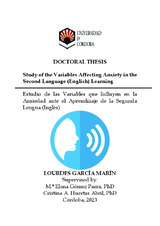Study of the variables affecting anxiety in the second language (English) learning
Estudio de las variables que influyen en la ansiedad ante el aprendizaje de la segunda lengua (Inglés)
Autor
García Marín, Lourdes
Director/es
Gómez Parra, María ElenaHuertas Abril, Cristina
Editor
Universidad de Córdoba, UCOPressFecha
2023Materia
Second languageGlobal society
Common European Framework of Reference for Languages
Skills
Modes of communication
English
METS:
Mostrar el registro METSPREMIS:
Mostrar el registro PREMISMetadatos
Mostrar el registro completo del ítemResumen
Mastering a second language (L2) is a must in 21st century global society. Nowadays, citizens interact with other citizens from all over the world through social media, so mastering an L2 has become the ultimate 21st century skill (Stein-Smith, 2018). In this context, students find many and varied opportunities to learn and use an L2, which is English in most cases (King, 2018). Moreover, the publication of the Common European Framework of Reference for Languages (CEFR) (Council of Europe, 2001) marked a turning point for the educational community, textbook authors, teachers, and learners. The CEFR describes the process of learning a target language by different types of competences (plurilingual and pluricultural competence, and communicative language competences) and sub-competences (linguistic, sociolinguistic, and pragmatic competence), and it uses descriptors for each of them. These descriptors were created without reference to a specific language, thus ensuring their relevance and universal applicability. Descriptors indicate progressive proficiency for each of the skills or modes of communication: reception, production, interaction, and mediation, and are rated on a six-point scale (A1, A2, B1, B2, C1, C2) (Council of Europe, 2020). Among the skills included in the CEFR, speaking focuses on qualitative aspects of language use, and the importance of mastering this oral skill when learning a language develops (e.g., there is a chart which was designed to assess spoken performances). Nevertheless, L2 learners might experience negative feelings towards speaking, as it means personal exposure to communication. As a consequence, the study of personal factors that may hinder learners from being successful in mastering the oral performance in an L2 stands as a relevant research topic in the area.

